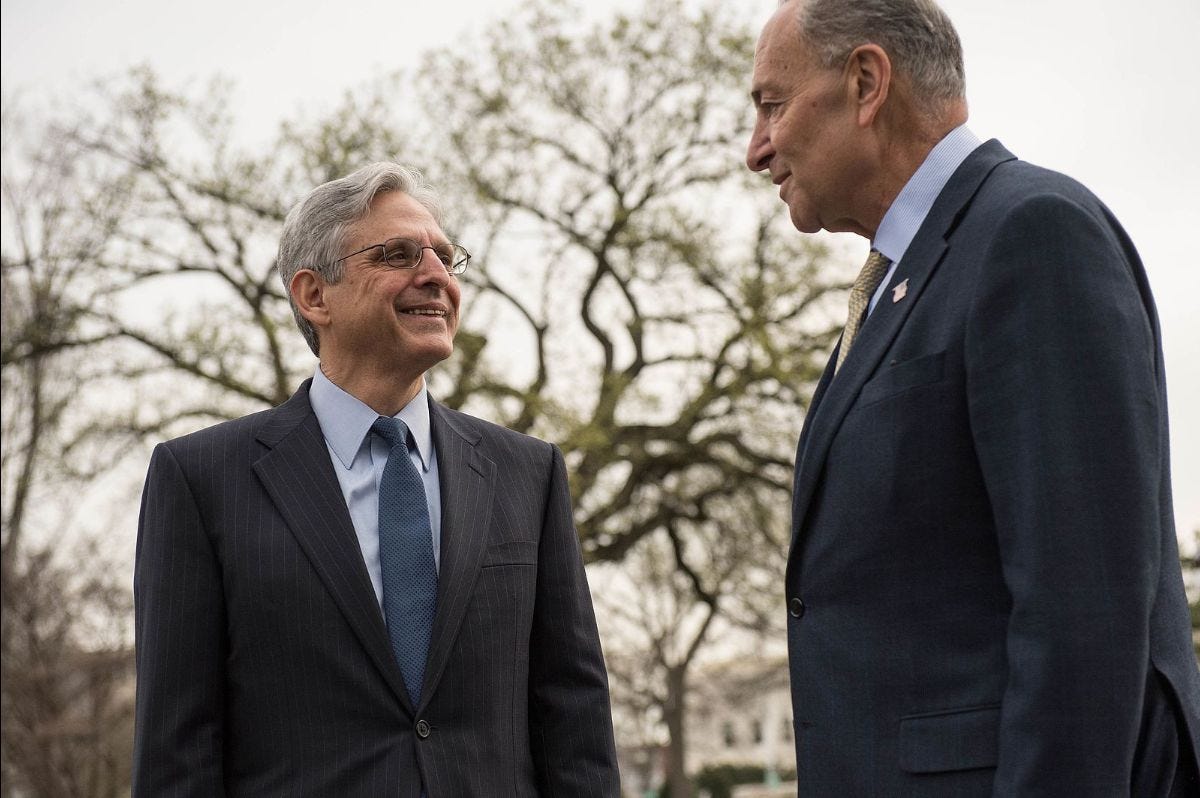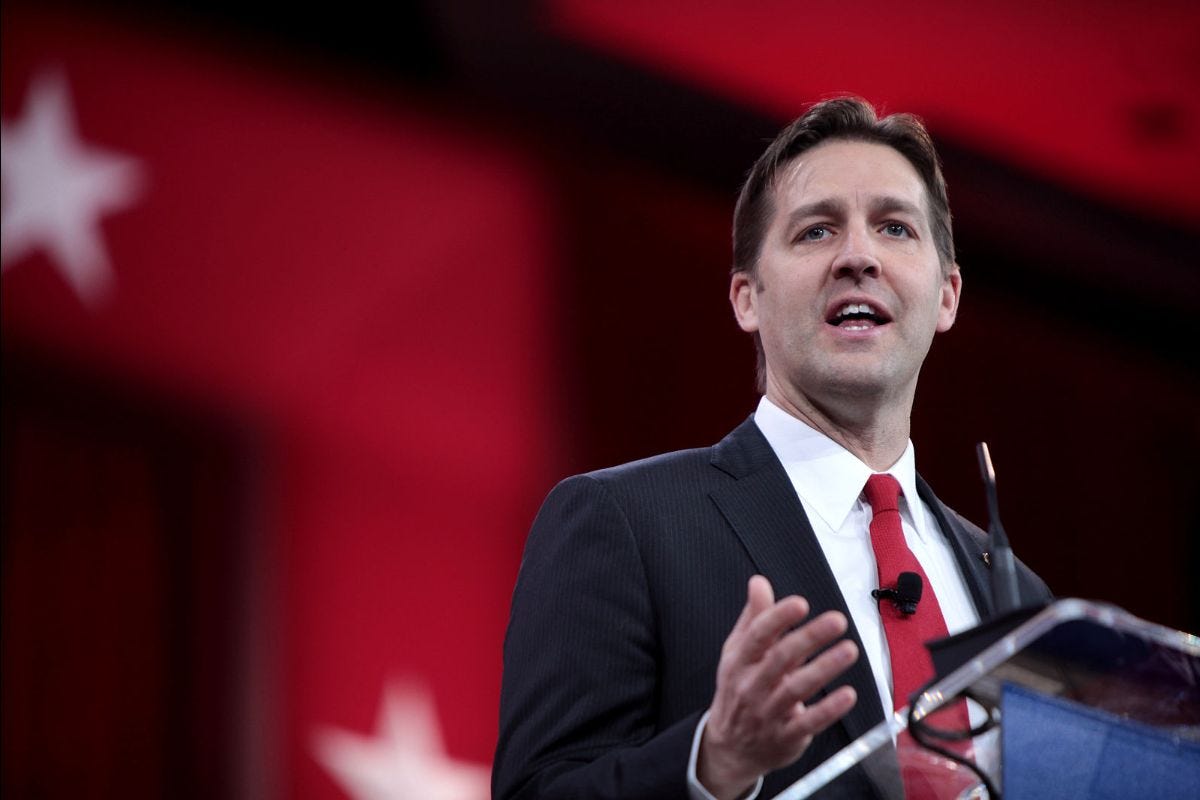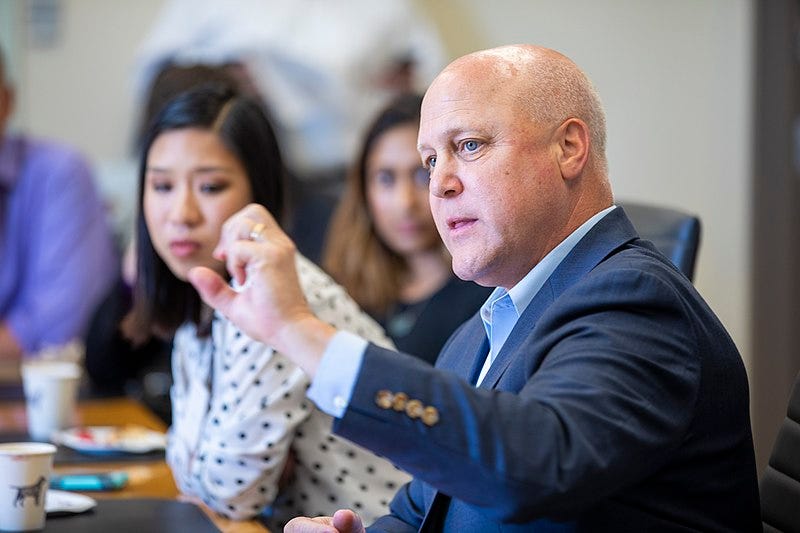Wake Up To Politics - July 8, 2022
Wake Up To Politics: Biden’s new actions on abortion
by Gabe Fleisher
Good morning! It’s Friday, July 8, 2022. Election Day 2022 is 123 days away. Election Day 2024 is 851 days away.
Thanks for Waking Up To Politics this week. If you enjoy the newsletter, it’s always appreciated when you share it with others or send a donation our way.
For your radar: Former Japanese prime minister Shinzo Abe, 67, died early this morning after being shot at a campaign event last night. The killing of the country’s longest-serving prime minister sent shockwaves through Japan, where only 10 incidents of gun violence were recorded last year.
Today, back by popular demand: As I wrote last month, one of the central theses of Wake Up To Politics is that, under the surface, a fair amount actually does get done in Washington each day.
That progress might not be on the flashiest, most hot-button issues — but there are still substantive actions happening on policies that can have a big impact on your life.
So, once again, I want to take a look back at the past week and give you a sense of what your leaders got done:
What happened in government this week
At the White House
📝 Today, President Biden will sign an executive order on abortion access, outlining his administration’s response to the Supreme Court’s recent decision overturning Roe v. Wade.
The executive order will direct the Secretary of Health and Human Services (HHS) to take actions to expand access to medication abortion and to contraception, while also issuing guidance clarifying physician responsibilities during medical emergencies.
In addition, Biden will direct the Attorney General to convene a network of volunteer lawyers who will work pro bono to defend women who travel across state lines to obtain an abortion.
The order will also call for federal agencies to take steps to protect the privacy of consumers seeking information about abortion from doctors or online, and to ensure the safety of abortion clinics.
Finally, Biden will establish an interagency task force to coordinate these and other actions related to protecting abortion rights.
💰 Earlier this week, Biden traveled to Cleveland, Ohio to announce a new program aimed at bailing out union pension plans in need of financial support.
The program will allow “multiemployer plans” — pension plans agreed to by a union and a group of companies across an industry — to apply for aid from the Pension Benefit Guaranty Corporation (PBGC), a federal agency.
Tied to Biden’s $1.9 billion Covid relief package, the new program is expected to allow about 200 additional pension plans to stay solvent at least through 2051, ensuring full benefits for 2 to 3 million more workers.
📞 Biden also called the wife of Brittney Griner, the WNBA star who has been detained in Russia since February on allegations that cannabis oil was found in her luggage.
Biden told Griner’s wife that he is “working to secure Brittney’s release as soon as possible” and read her his response to a letter Griner had written him earlier in the week.
The call was met with criticism from the sister of Paul Whelan, a U.S. citizen who has been detained in Russia since 2018, who called for Whelan’s family to receive similar presidential outreach.

At the Capitol
💊 Senate Democrats released their plan to allow Medicare to negotiate the cost of some prescription drugs. The proposal has the backing of all 50 Senate Democrats, including Sen. Joe Manchin (D-WV).
Under the proposal, beginning in 2023, the Secretary of Health and Human Services would be able to select up to 10 drugs for which the government could negotiate with companies to lower prices. The new prices would go into effect in 2026, with the option to negotiate on more drugs in later years.
The Democratic plan would also also offer free vaccines to Medicare beneficiaries and implement a $2,000-a-year cap on out-of-pocket drug costs for senior citizens on the program. It would also penalize drugmakers for raising their prices faster than inflation.
💸 Democrats also finalized a plan to tax wealthy Americans and use the money to bolster Medicare, which is currently on track to become insolvent by 2028.
The proposal would require people earning more than $400,000 a year to pay a 3.8% tax on earnings from “pass-throughs,” which are companies that do not pay corporate taxes. This will raise an estimated $203 billion over 10 years, which will be used to extend Medicare’s solvency to 2031.
The drug pricing proposal and the tax plan are the first provisions Democrats have released from their broader tax-and-spending package currently in the works. Democrats are aiming to pass the package through the reconciliation process, which means it can’t be filibustered and needs only a simple majority.
📱 Sens. Mark Warner (D-VA) and Marco Rubio (R-FL), the leaders of the Senate Intelligence Committee, issued a bipartisan call for the Federal Trade Commission to investigate TikTok and its parent company, ByteDance.
The senators cited a BuzzFeed report that ByteDance employees based in China have “repeatedly accessed non-public data about U.S. TikTok users,” despite the company’s sworn testimony to the contrary.
At the agencies
👩⚖️ The Justice Department sued Arizona over a state law requiring proof of citizenship to vote in presidential elections.
The lawsuit alleges that the law — which was put in place to prevent voter fraud — violates the Civil Rights Act of 1964 and the National Voter Registration Act of 1993.
👨🎓 The Education Department announced changes to the federal student loan system and launched an effort to recruit 250,000 tutors and mentors to help students who have fallen behind in school during the pandemic.
The student loan changes — which will go into effect in 2023 and could impact as many as 40 million Americans — will expand student loan debt cancellation for borrowers who work in public service and for those who were defrauded by for-profit colleges.
🍼 The Food and Drug Administration (FDA) unveiled a new framework aiming to diversify the American baby formula market, including by making it easier for foreign companies with temporary approval to permanently sell in the U.S.
Meanwhile, “Operation Fly Formula” coordinated two additional flights of baby formula to the U.S., bringing more than 500,000 pounds of formula from overseas.
🏥 The FDA also gave permission to pharmacists to prescribe Paxlovid, the Covid antiviral pill by Pfizer.
With only doctors, nurses and physician assistants previously able to prescribe it, some patients had been having difficulty gaining access to the treatment. The change will allow the nation’s 300,000 pharmacists to prescribe Paxlovid as well, significantly expanding access.
✈️ The Transportation Department announced plans to award nearly $1 billion to 85 U.S. airports to upgrade their terminals. The funding comes from the bipartisan infrastructure package signed into law last year.
Here is a map showing the airports receiving funding, and what they’ll be using the money for.

Ask Gabe: What is the Jan. 6 committee’s goal?
Erin from Minneapolis asks: “What is the end goal of the Jan. 6 committee? They clearly hope to lay out the case that Trump is guilty of these crimes. But to what end?”
The January 6th committee hearings are being aired for all to see, but they are perhaps best viewed as one extended letter to Attorney General Merrick Garland.
The members of the panel have been quite clear about their goal: they want Garland to indict Trump, and ASAP. You’ll notice that Rep. Liz Cheney (R-WY) and other committee members pepper their statements with words like “corruptly” and “illegally”; they frequently quote from criminal statues, seeking to make the case that Trump incited violence, or obstructed Congress, or defrauded his donors.
Those are all pokes at Garland, trying to get him to step up his investigation and hand down charges. Along the same lines, the panel is hoping to use the hearings to mold public opinion in such a way that pressure builds on Garland to indict.

What else is the committee trying to do? There is clearly a political dimension here as well. The panel’s Democratic leaders are seeking to bring January 6th — and Trump himself — back in the news, which they view as a vulnerability for Republicans ahead of the midterms.
If the panel is able to get reporters and voters talking about January 6th again (instead of inflation or untold other topics that are Democratic vulnerabilities), the thinking goes, maybe the party still have a shot in November.
Finally, if you listen to Cheney, there is one more goal she clearly has: Changing Republican minds. She’ll often use her allotted speaking time to address her co-partisans directly, urging them to leave Trump in the dust.
Somewhat surprisingly, that might be the effort of theirs that’s been most successful so far: as I wrote on Monday, there are mounting signs that some Republican elites, at least, are starting to grow wary of Trump and look in other directions (see DeSantis, Ron).
What you’re saying: 2024 presidential picks
Earlier this week, I wrote about some of the possible candidates — not named Donald Trump or Joe Biden — who might seek the White House in 2024.
I also asked for you all to send in politicians who intrigue you and who you’ll be watching as the 2024 conversations continue. Here are some of the names I heard most from WUTP readers:
Democrats
Former New Orleans mayor Mitch Landrieu, 61: after gaining notoriety for removing Confederate statues in Louisiana, he’s now a White House senior adviser on infrastructure.
Maryland Rep. Jamie Raskin, 59: a constitutional law professor who served as a Trump impeachment manager and now sits in the January 6th committee.
Connecticut Sen. Chris Murphy, 48: fresh off of his success negotiating a bipartisan deal on gun control, his signature issue.
Ohio Sen. Sherrod Brown, 69: known for his “dignity of work” platform and ability to win as a progressive in a lean-red state.
Georgia gubernatorial nominee Stacey Abrams, 48: a former state legislator who is currently running in a rematch with Gov. Brian Kemp.
Republicans
Nebraska Sen. Ben Sasse, 50: a former college president who navigated an on-again, off-again relationship with President Trump.
Arkansas Gov. Asa Hutchinson, 71: the longtime GOP fixture and frequent Sunday talk-show guest has teased a possible run.
Illinois Rep. Adam Kinzinger, 44: one of the GOP’s leading Trump critics, he’s leaving his seat in Congress early next year.
Former Secretary of State Condoleeza Rice, 67: since her trailblazing stint in the Bush administration, she’s waved off multiple presidential entreaties.
Independents
Maine Sen. Angus King, 78: a former governor who caucuses with Democrats in the Senate, one reader suggested he might be able to lead a coalition of disaffected members from both parties.

What’s going on in Washington today
All times Eastern.
— President Biden will receive his daily intelligence briefing (9:30 am), deliver remarks and sign an executive order on protecting access to abortion (11:30 am), and deliver remarks at CIA headquarters marking the agency’s 75th anniversary (3:40 pm).
Later, he’ll depart the White House (7:45 pm) for his vacation home in Rehoboth Beach, Delaware, where he’ll spend the weekend.
— Vice President Harris will attend Biden’s abortion speech (11:30 am) and then meet with state legislators from Indiana, Florida, South Dakota, Nebraska, and Montana to discuss the issue (4 pm).
— The White House briefing will be held by press secretary Karine Jean-Pierre (12 pm).
— Congress is on recess this week.
— The Supreme Court is on recess until October.
Correcting a correction
Last word on this: Earlier this week, I meant to write that every Black Democrat elected to the U.S. Senate before Raphael Warnock has run for president. I fumbled the correction in yesterday’s newsletter.
Also in yesterday’s newsletter, I wrote about President Biden’s reported plans to nominate an anti-abortion judge in Kentucky but in one reference, wrote “Kennedy,” which is not a state.
My sincere apologies for any confusion either error caused — and thanks to the readers who flagged them.
Before I go...
Here’s something sweet: Thursday was Jimmy and Rosalynn Carter’s 76th wedding anniversary.
Theirs is the longest marriage in presidential history, with George H.W. and Barabara Bush’s 73-year union in second place. (Gerald and Betty Ford are a distant third, with 58 years. Here’s the full list.)
Not only does the length of the Carter marriage stick out among presidents, it just sticks out, period. Reaching year 76 “is a milestone that is so rare that the U.S. Census Bureau doesn’t keep statistics on how many couples make it that far,” the Atlanta Journal-Constitution notes. “Only 6% of married couples make it to even 50 years.”
The couple started dating in 1945, when Jimmy was 21 and Rosalynn was 18; she was friends with his younger sister, Ruth. They were married the next year.
That’s it for today. If you enjoy Wake Up To Politics, it’s always appreciated if you donate to support the newsletter or buy some merch. Or if you tell your friends and family to sign up at wakeuptopolitics.com.
If you have any questions or feedback, feel free to email me: my inbox is always open.
Thanks for waking up to politics! Have a great day.
— Gabe






